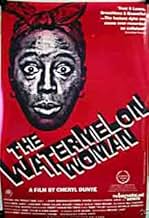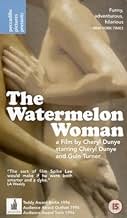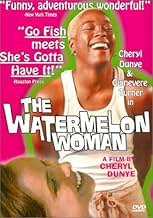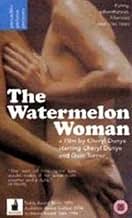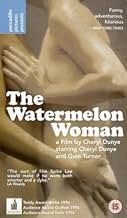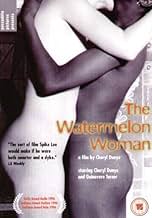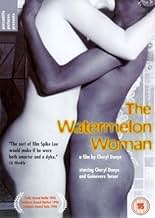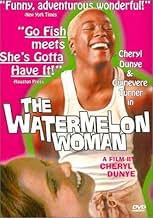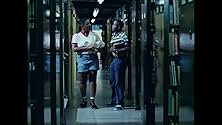AVALIAÇÃO DA IMDb
7,1/10
4,3 mil
SUA AVALIAÇÃO
Uma jovem cineasta lésbica negra investiga a vida de uma atriz negra dos anos 30 que interpretou arquétipos de 'mamãe' - um estereótipo que representa mulheres negras que trabalham em uma fa... Ler tudoUma jovem cineasta lésbica negra investiga a vida de uma atriz negra dos anos 30 que interpretou arquétipos de 'mamãe' - um estereótipo que representa mulheres negras que trabalham em uma família branca e cuidam dos filhos da família.Uma jovem cineasta lésbica negra investiga a vida de uma atriz negra dos anos 30 que interpretou arquétipos de 'mamãe' - um estereótipo que representa mulheres negras que trabalham em uma família branca e cuidam dos filhos da família.
- Direção
- Roteiristas
- Artistas
- Prêmios
- 4 vitórias no total
Cheryl Clarke
- June Walker
- (as Cheryl Clark)
Kat L Robertson
- Yvette
- (as a different name)
Avaliações em destaque
This is a very lighthearted film about a black video store clerk (Cheryl Dunye) who wants to make a documentary about an early black actress, known only as The Watermelon Woman." The fact that both Cheryl (Dunye) and the actress are lesbians keeps her going. In fact, in life imitating art, Cheryl finds that The Watermelon Woman was having a lesbian relationship with a white director, and then, she begins a relationship with a white video store customer (Guinevere Turner - American Psycho, Itty Bitty Titty Committee).
The film explored black language, early black actresses, black lesbians, mammies, and watermelon. It even featured an interview with Camille Paglia discussing mammies and watermelon in the context of blacks and Italians, It's nice to see Italians spoken of in something other than the Mob.
Her BFF Tamera (Valarie Walker) is a party girl, but she draws the line at interracial relationships, and that causes a problem for Cheryl.
There are a lot of good scenes throughout the movie, and it made it worthwhile even if the acting wasn't particularly good.
The end credits will surprise you.
The film explored black language, early black actresses, black lesbians, mammies, and watermelon. It even featured an interview with Camille Paglia discussing mammies and watermelon in the context of blacks and Italians, It's nice to see Italians spoken of in something other than the Mob.
Her BFF Tamera (Valarie Walker) is a party girl, but she draws the line at interracial relationships, and that causes a problem for Cheryl.
There are a lot of good scenes throughout the movie, and it made it worthwhile even if the acting wasn't particularly good.
The end credits will surprise you.
I liked how The Watermelon Woman blends a fictional narrative with real historical questions. Cheryl Dunye's storytelling is both creative and personal, making for a film that feels intimate and reflective. The indie production value is noticeable, and it's not a movie that will wow you with visuals, but its heart and purpose shine through. A solid film that's definitely worth checking out if you're into indie or queer cinema. The film's style is a bit unconventional, and it's not always the smoothest ride, but it's an important piece of cinema that sheds light on stories we don't often hear. It may not be for everyone, but I found it thought-provoking and original.
The Watermelon Woman (1996) -
I suppose that as a homosexual white British man, I probably wasn't exactly the target audience for this Black, Lesbian film from the U. S., although that in itself goes against my belief that people should explore genres out of their comfort zone, because otherwise they will never know if there is more to life. I could certainly see the appeal of this one for some and the message it was trying to get out. I just didn't like the sex scenes very much (Eek Boobies!).
For the most part, the story was fictionalised and the title character of "The Watermelon Woman" was a vehicle to discuss the injustices of racial bigotry in the world of cinema since the dawn of it's creation and to a certain extent the rest of the time since too.
Although this film did indicate some essence of racism towards white people, for the fact that they allegedly can't understand the persecutions faced by the black community and I wondered if that was deliberate or something that was a missed irony.
The lead character Cheryl played by the writer and director Cheryl Dunye wanted to track down the movements of The Watermelon Woman's past to find out what had happened to her and she studied the golden age of cinema in order to do so. Her journey was quite interesting. I did have to wonder if the whole film might have actually been better if it was presented as a documentary, about actual, real actors of the past that weren't given their dues accordingly.
There was a mention of Hattie McDaniel included here. She was famously snubbed at the Oscars when she went to receive her award for the part of Mammy in 'Gone With The Wind' (1939) and was made to sit in another room and only allowed to enter the main area for the presentation of her statue. Her story was partly covered in the TV series 'Hollywood' (2020) and I'm sure that wasn't delivered wholeheartedly or completely truthfully, because it was a very glamourised interpretation of the early years of Hollywood anyway and it dared to conceive an idea that perhaps these prejudices and things should have been exposed much earlier for their idiocy.
I did say that it might have worked better as a documentary, because I could see that Cheryl was obviously passionate about her message, but the acting really wasn't the best and the film quality was quite poor too, not even just the bits where it was filmed on an old video camera. There were some cheap and odd editing choices and many of the characters were a tad unfriendly while others were perfectly odd including the "Professor" and the C. L. I. T. volunteer (Sarah Schulman).
The style of it actually reminded me of 'Tangerine' (2015), a trans/drag film which was filmed entirely on a smart phone. There were similarities in the direction and the attempt at realism, but this film was far less obnoxious of course, because 'Tangerine' was vile.
It also had a hint of 'Not Another Gay Movie' (2006) too. Those producers, etc must surely have taken inspiration from this film, because the video shop was almost identical.
Not really my thing, but I would definitely recommend it to the appropriate people, because I know some that would appreciate it for its various plus points.
606.19/1000.
I suppose that as a homosexual white British man, I probably wasn't exactly the target audience for this Black, Lesbian film from the U. S., although that in itself goes against my belief that people should explore genres out of their comfort zone, because otherwise they will never know if there is more to life. I could certainly see the appeal of this one for some and the message it was trying to get out. I just didn't like the sex scenes very much (Eek Boobies!).
For the most part, the story was fictionalised and the title character of "The Watermelon Woman" was a vehicle to discuss the injustices of racial bigotry in the world of cinema since the dawn of it's creation and to a certain extent the rest of the time since too.
Although this film did indicate some essence of racism towards white people, for the fact that they allegedly can't understand the persecutions faced by the black community and I wondered if that was deliberate or something that was a missed irony.
The lead character Cheryl played by the writer and director Cheryl Dunye wanted to track down the movements of The Watermelon Woman's past to find out what had happened to her and she studied the golden age of cinema in order to do so. Her journey was quite interesting. I did have to wonder if the whole film might have actually been better if it was presented as a documentary, about actual, real actors of the past that weren't given their dues accordingly.
There was a mention of Hattie McDaniel included here. She was famously snubbed at the Oscars when she went to receive her award for the part of Mammy in 'Gone With The Wind' (1939) and was made to sit in another room and only allowed to enter the main area for the presentation of her statue. Her story was partly covered in the TV series 'Hollywood' (2020) and I'm sure that wasn't delivered wholeheartedly or completely truthfully, because it was a very glamourised interpretation of the early years of Hollywood anyway and it dared to conceive an idea that perhaps these prejudices and things should have been exposed much earlier for their idiocy.
I did say that it might have worked better as a documentary, because I could see that Cheryl was obviously passionate about her message, but the acting really wasn't the best and the film quality was quite poor too, not even just the bits where it was filmed on an old video camera. There were some cheap and odd editing choices and many of the characters were a tad unfriendly while others were perfectly odd including the "Professor" and the C. L. I. T. volunteer (Sarah Schulman).
The style of it actually reminded me of 'Tangerine' (2015), a trans/drag film which was filmed entirely on a smart phone. There were similarities in the direction and the attempt at realism, but this film was far less obnoxious of course, because 'Tangerine' was vile.
It also had a hint of 'Not Another Gay Movie' (2006) too. Those producers, etc must surely have taken inspiration from this film, because the video shop was almost identical.
Not really my thing, but I would definitely recommend it to the appropriate people, because I know some that would appreciate it for its various plus points.
606.19/1000.
When we first see clips of old film actor Fae Richards, the person the protagonist (Cheryl Dunye) is researching, it's immediately apparent that she's fictional, and I initially thought it was an unfortunate choice. But as it played out, it hit me: what does it say when a black lesbian director invents this person, and the researcher has a hard time finding information on her? Probably that there simply was not adequate representation, and that history is usually whitewashed. At the end of the credits, the line "Sometimes you have to create your own history" gave me goosebumps. Along the way there are things on the surface that will undoubtedly draw reactions - the wildly uneven acting and indie production value, and a sex scene that seemed restrained and erotic to me but which unfortunately drew the ire of conservatives in Congress. Aside from the representation the film gives us, it's filled with things that critique the world this woman lives in. There's the obvious barb in the fictional actor being dubbed "Watermelon Woman" and being famous for her role in "Plantation Memories." Another is the librarian explaining to her that she should check the "black reference" files for the old film star, and the silent little look she exchanges with her friend. There's also the white film professor explaining how modern black scholars have it wrong relative to the offensiveness of the "mammy" figure, which was brilliant. It comes within the community too; when her friend frowns upon the relationship she's having with a white woman, she says it's nobody's business who she's having sex with. Amen. Despite the choppiness of a few scenes which almost seem like parodies of themselves, I genuinely enjoyed this film. It's creative, empowering, and well-paced in its 85 minutes. There's also something pretty powerful about the message at its center.
There are themes and issues in this film that are obvious, but well defined and used - lesbianism, racism, interracial relationships.... and the ups and downs of working in a video rental shop. All that aside, I have to say that, for me "The Watermelon Woman" is all about obsession. Ah - obsession! The obsession in this case is our leading lady's obsession with a marginal black actress in black & white movies of days long gone by, credited in the films on as "The Watermelon Woman." Who was she... what was her real name... why was she someone to obsess upon? Our lovely leading lesbian begins a journey of body and mind to find the truth of the Watermelon Woman and her life. I tell you obsession is a wondrous thing... when you find something (or, if you're me, many things) to obsess on, your life will be filed with the richness of discovery.. and you'll never be a boring party guest. So, have a look at "The Watermelon Woman," who knows you may just find yourself obsessed. Super sweet.
Você sabia?
- CuriosidadesAccording to writer/director Cheryl Dunye, much about the character she plays in the film is autobiographical, but the historical references to the Watermelon Woman are fictional: "The Watermelon Woman came from the real lack of any information about the lesbian and film history of African-American women. Since it wasn't happening, I invented it."
- Erros de gravaçãoCheryl (Cheryl Dunye) appears to make a slight fluff of her lines during a dinner scene with Diana, Tamara and Stacey, saying: "Anyway, Diana, if you came to Philadelphia to shape... escape the cold Chicago winters..."
However, as the dinner conversation is deliberately uncomfortable, this is possibly intended.
- Cenas durante ou pós-créditosThe film, which seems to be a documentary about Cheryl's search for the obscure actress who inspired her, ends with these printed words: "Sometimes you have to create your own history. The Watermelon Woman is fiction. Cheryl Dunye, 1996"
- Versões alternativasIn 2016, director Cheryl Dunye's landmark Black Queer Film THE WATERMELON WOMAN was re-released in select theaters and festivals with a pristine 2K HD restoration overseen by the production company 13th Gen, in partnership with Modern Videofilm. The restoration and re-release was sponsored by First Run Features, the Outfest UCLA Legacy Project, and the Toronto International Film Festival. This theatrical tour will be followed by a DVD re-release in early 2017.
- ConexõesFeatured in Fabulous! The Story of Queer Cinema (2006)
Principais escolhas
Faça login para avaliar e ver a lista de recomendações personalizadas
- How long is The Watermelon Woman?Fornecido pela Alexa
Detalhes
Bilheteria
- Orçamento
- US$ 300.000 (estimativa)
- Faturamento bruto nos EUA e Canadá
- US$ 1.989
- Fim de semana de estreia nos EUA e Canadá
- US$ 774
- 13 de nov. de 2016
- Faturamento bruto mundial
- US$ 1.989
- Tempo de duração1 hora 25 minutos
- Cor
Contribua para esta página
Sugerir uma alteração ou adicionar conteúdo ausente

Principal brecha
By what name was The Watermelon Woman (1996) officially released in India in English?
Responda



